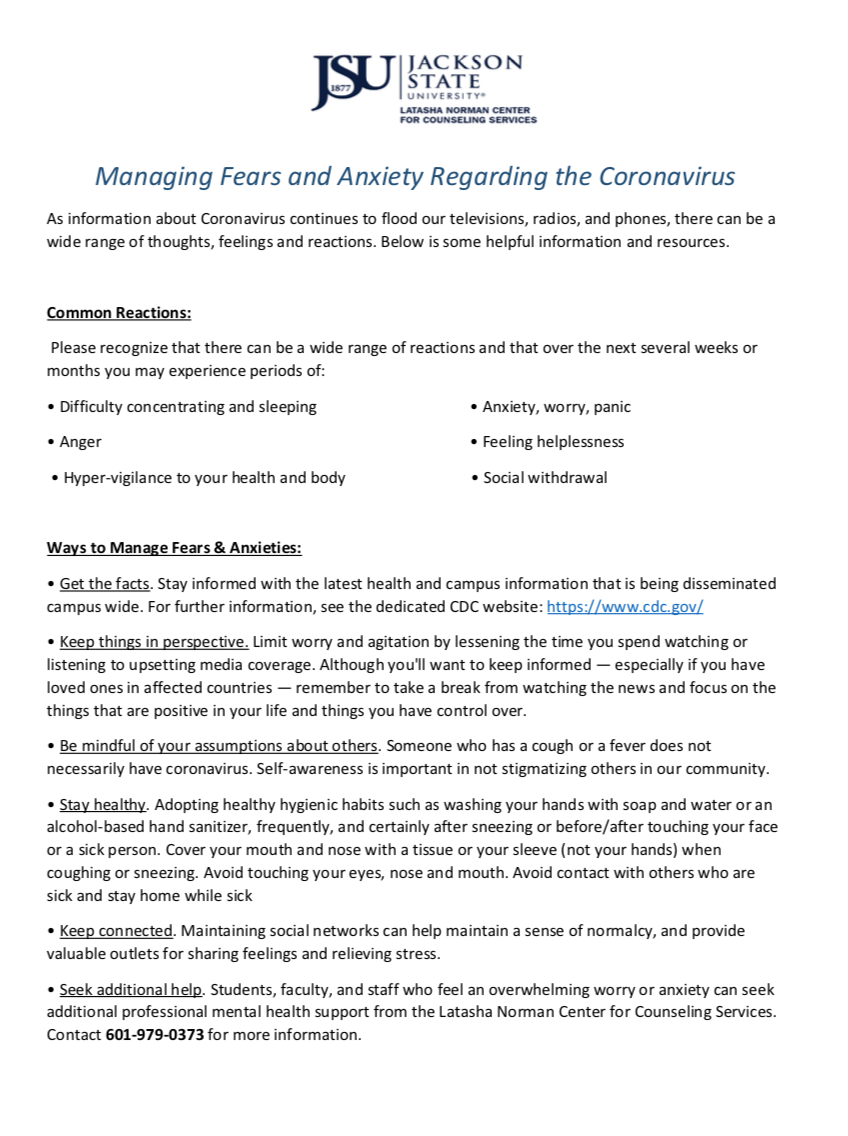![]()
[hr]  JSU students left for spring break during the week of March 9-13, anticipating returning to campus after some much needed rest and relaxation with their family and friends.
JSU students left for spring break during the week of March 9-13, anticipating returning to campus after some much needed rest and relaxation with their family and friends.
All of their hopes were shattered when the spread of the Coronavirus increased rapidly in every state causing schools and colleges all over the United States to physically close their doors and transition to online learning.
The Coronavirus disease (COVID-19) is highly infectious and caused by a new virus. The disease causes respiratory illness (similar to the flu) with symptoms including: a cough, fever and difficulty breathing. Individuals are encouraged to protect themselves from the virus by frequently washing their hands, avoiding touching the face, and no close contact with people who are experiencing symptoms.
The lead therapist at the LaTasha Norman Center, Shanice White explains the negative effects the pandemic may be having on JSU students.
“COVID-19 may have negative effects on our students including difficulty with concentrating and sleeping due to constant worrying, ruminating/racing thoughts regarding the virus; anger due to not being able to hang out with friends at various locations off campus, such as restaurants,bars, etc.; feeling disconnected, hopeless, lonely, and helpless, which can lead to thoughts, ideations, gestures, or even attempts of suicide; homesickness due to not being able to home. Some students may also feel a sense of shame and/or guilt due to not having anywhere to go and, hence, feeling trapped or stuck on campus.”
In this time of uncertainty, she explains why it is so important for students to seek assistance when they experience depression, increased anxiety and suicidal thoughts due to COVID-19.
“These concerns can escalate very quickly due to the social isolation that most states are requiring individuals to resort to,” says White. “Social disconnect, distancing, or isolation may cause sudden disruptions in social interaction, something that many students thrive on. Stripping this way from them can definitely cause mental health concerns that may not have been present prior to COVID-19, or exacerbate underlying mental healthconditions that have never manifested until now.”
Additional resources for students seeking ways to cope with mental health issues due to COVID-19 are below:
- https://www.cdc.gov/coronavirus/2019-ncov/prepare/managing-stress-anxiety.html?CDC_AA_refVal=https%3A%2F%2Fwww.cdc.gov%2Fcoronavirus%2F2019-ncov%2Fabout%2Fcoping.html
- https://www.youtube.com/watch?v=xP14-Pc56xU
- https://suicidepreventionlifeline.org/
- www.jsums.edu/latashanormancenter
LNC Social Media (Instagram, Twitter, and Facebook): @jsulnc/ JSU Latasha Norman Center







